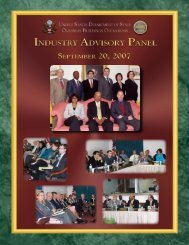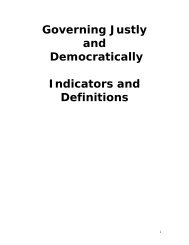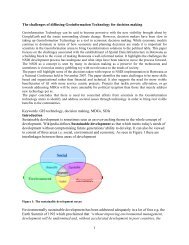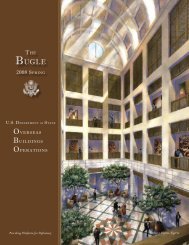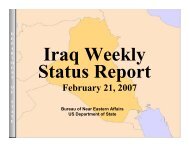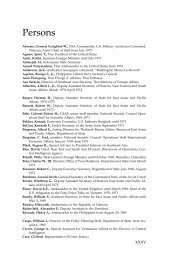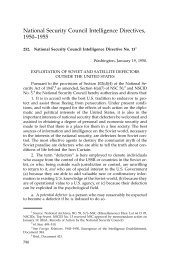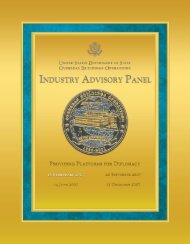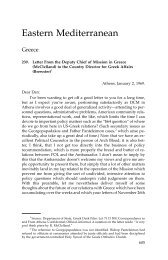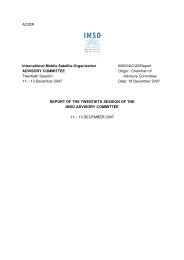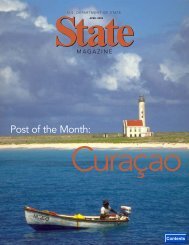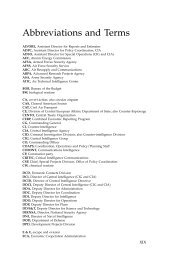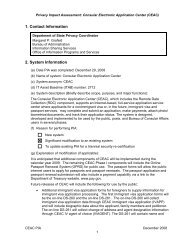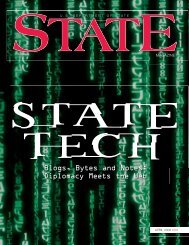SAFE PASSAGE - US Department of State
SAFE PASSAGE - US Department of State
SAFE PASSAGE - US Department of State
You also want an ePaper? Increase the reach of your titles
YUMPU automatically turns print PDFs into web optimized ePapers that Google loves.
Pat Roe<br />
VOLUME II<br />
<strong>SAFE</strong> <strong>PASSAGE</strong><br />
A Newsletter for the Humanitarian Mine Action and Small Arms/Light Weapons Communities<br />
Rice Mill for Landmine Survivors Opens in Cambodia<br />
by Imbert Matthee with Contributions from Pat Roe [Clear Path International]<br />
As they bring in the harvest from their fields near the still-deadly K5<br />
Mine Belt on Cambodia’s border with Thailand, the landmine amputees-turned-farmers<br />
here know exactly what to do with their rice this<br />
year. They are taking it to a brand new mill in Seam village’s Bovel<br />
district where they get good prices, training in better farming methods,<br />
microloans and a chance to meet other members <strong>of</strong> their newly<br />
formed farming cooperatives. The mill, at the heart <strong>of</strong> Cambodia’s<br />
most productive rice-growing region, is also a place where landmine<br />
survivors work and receive vocational training in mechanics.<br />
The $500,000 project became possible with grants from the U.S.<br />
<strong>Department</strong> <strong>of</strong> <strong>State</strong>’s Office <strong>of</strong> Weapons Removal and Abatement<br />
(PM/WRA), Adopt-A-Minefield and the McKnight Foundation. Mines<br />
Advisory Group conducted the clearance <strong>of</strong> the land. The Cambodian<br />
Ministry <strong>of</strong> Agriculture provided assistance in the design <strong>of</strong> the project’s<br />
community based agricultural extension training.<br />
Two years after plans for this enterprise were made, the shiny new<br />
processing plant devoted to improving the lives <strong>of</strong> landmine survivors<br />
and their families became a reality. It was blessed by Buddhist monks<br />
and dedicated by government <strong>of</strong>ficials and the partners on December<br />
3, 2007—just in time for the 2008 harvest. Yi Yion, Secretary <strong>of</strong> <strong>State</strong><br />
for the Ministry <strong>of</strong> Social Affairs, Veterans & Youth Rehabilitation;<br />
Sun Heng, Vice Governor <strong>of</strong> Batambang province; Sir Vin Huot,<br />
Bovel District Governor; and nearly 100 landmine survivors and family<br />
members attended the dedication.<br />
All <strong>of</strong> them received a tour<br />
<strong>of</strong> the plant and a lunch prepared<br />
with rice from the new mill.<br />
The first rice from the mill fills a bag<br />
bearing the project logo.<br />
It began with a need to create selfsufficient<br />
survivor communities in<br />
Battambang province and to generate<br />
income to pay for survivor<br />
vocational training. Without the<br />
major players in the mine action<br />
community coming together this<br />
could not have happened.<br />
A partnership between Clear Path<br />
International, based in Vermont,<br />
and the Phnom Penh-based nongovernmental<br />
organization Cambodian<br />
Volunteers for Community<br />
Development, the rice mill proj-<br />
MAY 2008 ISSUE 13<br />
Pat Roe<br />
Arn Chorn Pond (left) addresses attendees at the opening <strong>of</strong> the CVCD/CPI<br />
rice mill before Buddhist monks bless the new factory.<br />
ect has already benefited more than 900 people, including the disadvantaged<br />
urban families to whom the high-quality rice is sold in<br />
bulk and on accessible credit.<br />
The mill employs nine people and has trained 30 survivors in mechanical<br />
skills. Eight core trainers have received specialized extension<br />
courses to begin community based training in rice growing, vegetable<br />
cultivation, fruit tree growing, fish farming and bee keeping. Seventyfive<br />
households representing 375 members have received microloans.<br />
About 500 vulnerable households in the Phnom Penh area have begun<br />
receiving better, more affordable rice from the mill project.<br />
In the coming years, thousands more are expected to benefit from the<br />
project’s activities as the network <strong>of</strong> amputee farmers’ coops grows<br />
and the rice mill ramps up its processing capacity, says Doeur Sarath,<br />
CVCD’s Executive Director. “The districts <strong>of</strong> Bovel, Phnom Pruk and<br />
Sampeuv have some <strong>of</strong> the country’s highest per-capita populations <strong>of</strong><br />
landmine accident survivors,” he says, citing data gathered by MAG<br />
and the Cambodian Mine Action Centre. “We found most <strong>of</strong> them<br />
wanted help to be successful rice farmers.”<br />
Among these successful farmers are Sok Khek, 71, and his 17-yearold<br />
grandson, Khek Sam Ath. In 1990, the elder Khek settled in the<br />
area to farm and support his family, including the younger Khek who<br />
lost his left arm to an explosive-remnant-<strong>of</strong>-war accident at age seven.<br />
Two other family members, Khek’s daughter and his older brother,<br />
are also disabled.<br />
Continued on Page 4, “Mill”<br />
MAY 2008 1
World Education Conducting Mine Risk Education<br />
by Connie Woodberry [World Education]<br />
From 1964 to 1973, the People’s Democratic Republic <strong>of</strong> Lao suffered<br />
some <strong>of</strong> the heaviest aerial bombing in world history. A significant<br />
amount <strong>of</strong> ordnance did not explode on impact and still threatens<br />
the lives and livelihoods <strong>of</strong> villagers. Children are particularly at risk<br />
because <strong>of</strong> their natural curiosity and lack <strong>of</strong> knowledge about the<br />
dangers <strong>of</strong> unexploded ordnance. In addition, the unexploded cluster<br />
bomblets can be mistaken for balls and can explode with lethal force<br />
if moved, heated or struck.<br />
Thirty years after the end <strong>of</strong> the Vietnam War, 15 <strong>of</strong> 18 provinces<br />
in Laos are still contaminated by UXO. Because <strong>of</strong> the devastating<br />
physical, social and financial impact on individuals injured by landmines<br />
and UXO, the prevention <strong>of</strong> these accidents and assistance to<br />
accident survivors are critical issues in Laos.<br />
World Education, a nonpr<strong>of</strong>it organization founded in 1951 and<br />
based in Boston, has worked in over 60 countries, and is dedicated to<br />
improving the lives <strong>of</strong> the poor through economic and social development<br />
programs. World Education has been working in Laos since 1991<br />
assisting Lao refugees to successfully repatriate and improving the Lao<br />
health and agriculture systems. Since 2005, with funding from the<br />
<strong>Department</strong> <strong>of</strong> <strong>State</strong>’s Office <strong>of</strong> Weapons Removal and Abatement,<br />
World Education has been working in a variety <strong>of</strong> ways to increase the<br />
awareness <strong>of</strong> UXO and increase the local capacity to assist the injured<br />
survivors <strong>of</strong> UXO accidents.<br />
UXO Education and Awareness<br />
World Education has developed mine/UXO risk education curriculum,<br />
textbooks, and model lessons using a child-centered, activity-based<br />
teaching and learning approach. By March 2008, 4,500<br />
primary school teachers were trained from the nine most heavily<br />
impacted provinces. These primary school teachers then teach more<br />
than 165,000 students. Children learn about the dangers <strong>of</strong> UXO,<br />
Santo Polizzi joined the Interagency Man-Portable Air-Defense<br />
Systems Task Force housed in the Office <strong>of</strong> Weapons Removal<br />
and Abatement in January 2008 as the <strong>Department</strong> <strong>of</strong> Homeland<br />
Security/Transportation Security Administration Liaison.<br />
He has been with TSA since June 2002, and currently is<br />
the Deputy Special Agent in Charge <strong>of</strong> the Office <strong>of</strong> Security<br />
Assessments. Polizzi is also responsible for developing and coordinating<br />
domestic and international MANPADS Vulnerability<br />
Assessment Programs, as well as Joint Airport Vulnerability<br />
Assessments. Prior to joining TSA, Polizzi served as an <strong>of</strong>ficer in<br />
the United <strong>State</strong>s Marine Corps for 20 years, retiring with the<br />
rank <strong>of</strong> Major.<br />
Alexandra Lanouette has joined the policy section <strong>of</strong> PM/WRA<br />
for a six-month internship, working on a variety <strong>of</strong> conventional<br />
weapons destruction issues. She is finishing her last semester at<br />
the Monterey Institute <strong>of</strong> International Studies, where she is<br />
earning a Master <strong>of</strong> Arts in international policy studies with<br />
a specialization in international negotiation/conflict resolution.<br />
During her current graduate program she worked at the<br />
2 MAY 2008<br />
Hail and Farewell<br />
ways to protect themselves and how to be active in their communities<br />
to promote this knowledge.<br />
Students produce books and posters about the dangers <strong>of</strong> UXO based<br />
on stories from their own unique perspective. Parents and community<br />
members <strong>of</strong>ten read these books as well, and some have been developed<br />
into puppet shows. Currently, over 90 puppetry teams <strong>of</strong> five<br />
children each perform at a variety <strong>of</strong> schools and community gatherings,<br />
important ceremonies and Lao national festivities.<br />
World Education also is implementing programs to develop Lao<br />
capacity to support survivors <strong>of</strong> UXO and mine accidents, as well as<br />
clear UXO in the Plain <strong>of</strong> Jars region to improve the agricultural land<br />
there and initiate silk production on that land. For more information<br />
about World Education, please visit www.worlded.org.<br />
Girl with puppet in UXO education course.<br />
Naval Postgraduate School Center for Homeland Defense and<br />
Security’s Homeland Security Digital Library and interned last<br />
summer at the Small Arms Survey in Geneva.<br />
We say a fond farewell to Harry Murphey “Murf” McCloy, who<br />
retired in November 2007 after 47 years <strong>of</strong> federal service—11<br />
with PM/WRA and 36 with the U.S. Marine Corps, retiring at<br />
the rank <strong>of</strong> Colonel. He is considered a “founding father” <strong>of</strong> the<br />
first mine action <strong>of</strong>fice at the <strong>Department</strong> <strong>of</strong> <strong>State</strong>, the Office <strong>of</strong><br />
Humanitarian Demining Programs, and has earned a reputation<br />
as an expert in humanitarian mine action. McCloy continues to<br />
serve after retirement as a consultant to PM/WRA.<br />
McCloy’s replacement as Senior Advisor for Conventional<br />
Weapons Destruction, which encompasses everything from<br />
humanitarian mine action to MANPADS destruction, is Mark<br />
Adams. Also a retired Marine Colonel, Adams served in PM/<br />
WRA and in two <strong>of</strong> its predecessor <strong>of</strong>fices, PM/HDP and the<br />
Office <strong>of</strong> Plans, Policy and Analysis.<br />
Paul Wager
Santiago Castellon<br />
Spirit <strong>of</strong> Soccer Expands to Cambodia<br />
by Stacy Bernard Davis<br />
[Office <strong>of</strong> Weapons Removal and Abatement]<br />
Soccer—alternately, football—has a way <strong>of</strong> bringing people together.<br />
In addition to having fun, getting exercise and learning new skills or<br />
improving current ones, soccer also is being used in post-conflict<br />
societies to teach valuable lessons about landmines and UXO.<br />
History<br />
Spirit <strong>of</strong> Soccer is a nongovernmental organization founded in 1996<br />
by Scotty Lee, a former semi-pro player and “A-licensed” coach.<br />
His participation in a humanitarian relief mission to the former<br />
Yugoslavia in 1993–1994 motivated the creation <strong>of</strong> SOS to teach<br />
important health and safety messages to children through instruction<br />
and enjoyment <strong>of</strong> sports. Since its formation, tens <strong>of</strong> thousands <strong>of</strong><br />
children have received soccer coaching and mine-risk education from<br />
Spirit <strong>of</strong> Soccer-trained coaches in Bosnia and Herzegovina, Kosovo,<br />
Cambodia and, most recently, Iraq.<br />
Expansion<br />
Funding from the <strong>Department</strong> <strong>of</strong> <strong>State</strong>’s Office <strong>of</strong> Weapons Removal<br />
and Abatement in the Bureau <strong>of</strong> Political-Military Affairs since 2005<br />
allowed Spirit <strong>of</strong> Soccer to grow its program in the Balkans. Following<br />
that success, Spirit <strong>of</strong> Soccer formed new partnerships with the Laureus<br />
Sport for Good Foundation and FIFA, the international governing<br />
body <strong>of</strong> soccer, among others, and expanded its sports and MRE<br />
fundamentals to the children <strong>of</strong> Cambodia in 2006 with continued<br />
funding from PM/WRA. With headquarters in Battambang, Spirit<br />
<strong>of</strong> Soccer began to train coaches in soccer and mine-risk education<br />
fundamentals in June, and began field operations with six coaches—<br />
Advancing Landmine Victim Assistance<br />
through Creative Partnerships<br />
by Maggie Emery [C<strong>of</strong>feelands Landmine Victims Trust]<br />
Pedro Duarte in his c<strong>of</strong>fee farm in<br />
Nicaragua. Pedro lost one leg and the<br />
foot from the other to a landmine.<br />
What do Dean’s Beans, Green<br />
Mountain, Starbucks, Royal C<strong>of</strong>fee,<br />
the Colombian C<strong>of</strong>fee Federation,<br />
Grapes for Humanity and<br />
the <strong>Department</strong> <strong>of</strong> <strong>State</strong>’s Office<br />
<strong>of</strong> Weapons Removal and Abatement<br />
have in common? They are<br />
all joining the effort to help landmine<br />
victims in c<strong>of</strong>fee-growing<br />
communities through the C<strong>of</strong>feelands<br />
Landmine Victims’ Trust.<br />
The world’s third-largest exporter<br />
<strong>of</strong> c<strong>of</strong>fee, Colombia, now also<br />
has one <strong>of</strong> the world’s highest<br />
rates <strong>of</strong> casualties from mines<br />
and other explosive devices.<br />
In order to bring services to<br />
survivors <strong>of</strong> landmine accidents<br />
in c<strong>of</strong>fee-growing regions, the<br />
CLVT has partnered with the Colombian C<strong>of</strong>fee Federation. This<br />
unique partnership gives the CLVT access to the CCF’s extensive<br />
resources and on-the-ground networks. By working together, the<br />
CCF and CLVT can achieve a comprehensive solution that would be<br />
including two women, the firstever<br />
female licensed soccer coaches<br />
in Cambodia—at the start <strong>of</strong><br />
August 2006.<br />
In July 2007, international soccer<br />
star Sir Bobby Charlton and<br />
skateboard icon Tony Hawk visited<br />
Cambodia, observing and<br />
participating in a soccer-coaching<br />
clinic held by six locally trained<br />
coaches at a school in Otdar<br />
Mean Cheay, near the infamous<br />
K-5 Mine Belt, as part <strong>of</strong> Laureus’<br />
support for Spirit <strong>of</strong> Soccer. Then,<br />
in September, Spirit <strong>of</strong> Soccer was<br />
chosen as one <strong>of</strong> the first projects<br />
Having women coaches has given girls the<br />
opportunity to enjoy and play soccer for the<br />
very first time.<br />
to implement the Football for Hope initiative jointly sponsored by<br />
FIFA and streetfootballworld, with the goal <strong>of</strong> using the game to promote<br />
social change in the run-up to the 2010 World Cup in South<br />
Africa.<br />
In March 2008, over 240 Cambodian youth players participated in<br />
Spirit <strong>of</strong> Soccer’s first MRE/Soccer tournament. Players were bought<br />
in from mine-affected areas <strong>of</strong> Battambang province, and all the<br />
players and <strong>of</strong>ficials received MRE from the SOS coaches. To date,<br />
over 32,000 boys and girls at some 160 primary and secondary<br />
schools in Cambodia have received MRE from the dedicated team<br />
<strong>of</strong> Spirit <strong>of</strong> Soccer coaches. For more information, please visit<br />
www.spirit<strong>of</strong>soccer.net.<br />
unattainable by either group on its own. From an <strong>of</strong>fice within the<br />
local CCF compound in Manizales, CLVT will work with the local<br />
c<strong>of</strong>fee councils in the coming months to identify dozens <strong>of</strong> landmine<br />
survivors and coordinate rehabilitation services and economic<br />
reintegration strategies using existing local services such as CIREC<br />
and Tecnovo. Over the next six months, the CLVT will reach out to<br />
45 landmine survivors in the Caldas region.<br />
Founded in 2005, CLVT’s mission is to connect the international<br />
c<strong>of</strong>fee industry to landmine survivors in c<strong>of</strong>fee-growing regions. In<br />
the last three years the CLVT has made great strides thanks to its<br />
innovative and creative partnerships. For example, this past year,<br />
Dean’s Beans developed a special brew <strong>of</strong> c<strong>of</strong>fee as part <strong>of</strong> the CLVT<br />
holiday “Cup <strong>of</strong> Hope” campaign. Royal C<strong>of</strong>fee has directly engaged<br />
its customer base by including information about CLVT in<br />
its regular Christmas mailing and inviting CLVT representatives to<br />
speak at an annual “Barista Jam.” In addition to corporate support,<br />
grassroots and student outreach are also essential to the CLVT. These<br />
efforts have included presentations at local cafes and participation<br />
in fair trade events at Michigan <strong>State</strong> and Tufts University. Through<br />
these partnerships, and grants from PM/WRA, the CLVT raised over<br />
$150,000 (monetary and in-kind donations) in 2007.<br />
The C<strong>of</strong>feelands Landmine Victims’ Trust has found that these<br />
partnerships help to bridge the gap between different countries,<br />
cultures and languages. They make it possible for individuals in the<br />
U.S. to connect to general issues surrounding mine action, as well as<br />
to the c<strong>of</strong>fee farmers themselves and communities around the world<br />
that are the most impacted by landmines and remnants <strong>of</strong> war. To<br />
learn more about the CLVT, please visit www.c<strong>of</strong>feelandstrust.org.<br />
Vedran Knezevic<br />
MAY 2008 3
Derek Kish<br />
Combating Abandoned Weapons Caches in Sudan<br />
by Derek Kish [Office <strong>of</strong> Weapons Removal and Abatement]<br />
Devastated by over two decades <strong>of</strong> civil war, the Republic <strong>of</strong> Sudan has<br />
been inundated with explosive remnants <strong>of</strong> war and contains numerous<br />
caches <strong>of</strong> conventional weapons, mostly small arms and light weapons.<br />
These lethal vestiges <strong>of</strong> conflict continue to plague the Sudanese long<br />
after warfare’s end and can fuel fresh armed violence.<br />
Created haphazardly and abandoned at the cessation <strong>of</strong> hostilities,<br />
there are many unguarded SA/LW caches in Sudan. A typical stockpile<br />
may contain a number <strong>of</strong> assault rifles, projectiles, grenades, mortar<br />
rounds, rockets, fuses and landmines. Fueling lawlessness and instability,<br />
these weapons and munitions may be acquired by any <strong>of</strong> the<br />
numerous armed groups operating in the area.<br />
Even if they escape paramilitary hands, communities burdened with<br />
these caches face a severe humanitarian risk, one that was gravely illustrated<br />
in the February 2005 ammunition depot explosion in Juba. The<br />
primary blast killed dozens and<br />
injured hundreds while scattering<br />
countless amounts <strong>of</strong> unexploded<br />
ordnance to maim and<br />
kill at a later date.<br />
WRA-funded MAG EOD team preps<br />
for a demolition <strong>of</strong> over 5,000 pounds <strong>of</strong><br />
ordnance and ammunition.<br />
4 MAY 2008<br />
Neutralizing abandoned weapons<br />
caches is vital to stabilizing<br />
southern Sudan and plays<br />
an essential role in promoting<br />
the peace process as outlined<br />
in the Comprehensive Peace<br />
Agreement <strong>of</strong> 2005. Within the<br />
CPA, both the North and the<br />
South agreed to hold a 2008<br />
census, new elections in 2009,<br />
and an independence referendum<br />
in 2011. Crucial to the<br />
success and legitimacy <strong>of</strong> these<br />
three milestones is the return<br />
<strong>of</strong> internally displaced persons<br />
and refugees to participate in all<br />
these processes. Unfortunately,<br />
abandoned caches continue to cause casualties, and the presence <strong>of</strong><br />
uncontrolled weapons deters many IDPs and refugees from returning.<br />
To combat the multitude <strong>of</strong> risks abandoned caches present and to<br />
help stabilize southern Sudan, the U.S. <strong>Department</strong> <strong>of</strong> <strong>State</strong>’s Office<br />
<strong>of</strong> Weapons Removal and Abatement has made conventional weapons<br />
destruction a pillar <strong>of</strong> its Sudan program. Since 2003, PM/WRA<br />
has provided $1,760,000 to support Mines Advisory Group’s weapons<br />
destruction teams, operating primarily in the southern Equatoria<br />
regions <strong>of</strong> Sudan. Through community liaison and United Nations<br />
Mine Action Office direction, MAG’s mobile teams identify, assess<br />
and neutralize abandoned caches. MAG delivers fully-operational<br />
items to the southern Sudanese authorities and destroys all unserviceable<br />
or unwanted items. Through a 2006 grant from PM/WRA,<br />
MAG disposed <strong>of</strong> 42 stockpiles and eliminated or secured 339,844<br />
items <strong>of</strong> ERW.<br />
PM/WRA intends to continue to support these valuable conventional<br />
weapons destruction programs in South Sudan. Every cache neutralized<br />
reduces the severity <strong>of</strong> the threat that continues to take the lives<br />
and limbs <strong>of</strong> the Sudanese people and moves us one step closer to a<br />
stable Sudan.<br />
“Mill” Continued from Page 1<br />
When he joined the first farmers’ coop in spring 2006, Sok Khek<br />
had little savings and even fewer tools to cultivate rice effectively. The<br />
partners qualified his household for a $250 loan and his membership<br />
in the coop gave him access to equipment. After a successful harvest<br />
in early 2007, he repaid his loan in full. His grandson is employed at<br />
the mill as a security guard.<br />
Projections are that about 750 landmine survivors will benefit from<br />
the rice mill project by 2010, while at least 2,000 disadvantaged<br />
urban families will receive the plant’s rice every year. The mill itself is<br />
expected to generate revenues for vocational training programs within<br />
three years. For more information about Clear Path International,<br />
please visit http://www.cpi.org<br />
UNITED STATES DEPARTMENT OF STATE MINE ACTION PARTNERS<br />
Adopt-A-Minefield ▼ Association <strong>of</strong> Volunteers in International Service ▼ C King Associates Ltd ▼ Center for International Rehabilitation ▼<br />
Center for Teaching International Relations ▼ Children <strong>of</strong> Armenia Fund ▼ Children’s Surgical Centre ▼ CIREC ▼ Clear Path International<br />
▼ Coalition Against Landmines ▼ Cranfield University ▼ DanChurchAid ▼ Danish Demining Group ▼ DC Comics ▼ Demining Agency<br />
for Afghanistan ▼ Freedom Fields <strong>US</strong>A ▼ Global Care Unlimited ▼ Golden West Humanitarian Foundation ▼ Grapes for Humanity ▼<br />
HALO Trust ▼ Handicap International–France ▼ Health Volunteers Overseas ▼ Help Handicapped International ▼ Humpty Dumpty<br />
Institute ▼ Information Management and Mine Action Programs Inc. ▼ International Eurasia Press Fund ▼ Iraqi Mine and UXO Clearance<br />
Organization ▼ The Julia Burke Foundation ▼ Kids First Vietnam ▼ Landmines Blow! ▼ Lipscomb University ▼ MAG ▼ Marshall Legacy<br />
Institute ▼ MCPA–Afghanistan ▼ MDC–Afghanistan ▼ Medical Care Development International ▼ Messiah College Landmine Action<br />
Project ▼ Mine Action Information Center ▼ Newsweek Education Program ▼ One Sri Lanka Foundation ▼ Organization for Mine<br />
Clearance and Afghanistan Rehabilitation ▼ PeaceTrees Vietnam<br />
▼ People to People International ▼ The Polus Center for Social<br />
& Economic Development ▼ Prestige Health Care Technologies<br />
▼ Prosthetics Outreach Foundation ▼ Roots <strong>of</strong> Peace ▼ Dr.<br />
Ken Rutherford/Missouri <strong>State</strong> University ▼ Save the Children<br />
▼ Schonstedt Instrument Company ▼ South Florida Landmine<br />
Awareness Group ▼ Spirit <strong>of</strong> Soccer ▼ Students Partnership<br />
Worldwide ▼ Survey Action Center ▼ Survivor Corps ▼ Swiss<br />
Foundation for Mine Action ▼ United for Colombia ▼ United<br />
Nations Foundation ▼ Veterans for America ▼ Vietnam Veterans<br />
Memorial Fund ▼ World Education ▼ World Rehabilitation Fund ▼<br />
A Newsletter for the Humanitartian Mine Action and Small Arms/Light Weapons Communities<br />
Published by the Office <strong>of</strong> Weapons Removal and Abatement<br />
Bureau <strong>of</strong> Political-Military Affairs<br />
U.S, <strong>Department</strong> <strong>of</strong> <strong>State</strong><br />
2121 Virginia Ave. NW, Rm. 6100<br />
Washington, DC 20522<br />
<strong>SAFE</strong> <strong>PASSAGE</strong><br />
Phone: (202) 663-0093<br />
Fax: (202) 663-0090<br />
Email: SteveJE@state.gov<br />
www.state.gov/t/pm/wra<br />
U.S. <strong>Department</strong> <strong>of</strong> <strong>State</strong> Publication 11275 Printed in Washington DC, A/RPS/MMS 200-02642 (200)



